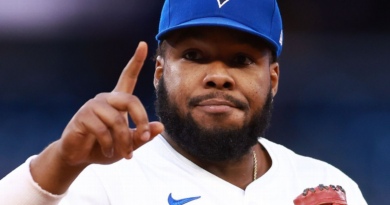USADA: UFC split imminent amid McGregor saga
The U.S. Anti-Doping Agency announced Wednesday that UFC fighter Conor McGregor has officially returned to the drug-testing pool, the next step ahead of a potential return fight. But CEO Travis Tygart’s statement in an accompanying news release came with a caveat: USADA’s partnership with the UFC will be over beginning Jan. 1, 2024.
Tygart wrote that the UFC and USADA had a “positive and productive meeting” about a contract renewal in May. But “the UFC did an about-face” and told USADA on Monday that the promotion would be going in a different direction, Tygart wrote. The UFC hired USADA to run its anti-doping program in 2015.
According to the USADA release, the relationship between the two parties was rendered “untenable” due to the situation with McGregor, the UFC’s top star.
“Fighters’ long-term health and safety — in addition to a fair and level playing field — are more important to USADA than short-term profits at the expense of clean athletes,” Tygart wrote in the statement.
McGregor removed himself from the USADA drug-testing pool after suffering a fractured leg in a fight against Dustin Poirier in July 2021. According to the UFC’s anti-doping policy, maintained by USADA, a fighter who re-enters the drug-testing pool must spend at least six months in it and pass two drug tests before competing again. There was a written exception to that rule. The UFC could waive the six-month rule for a fighter if it were deemed unfair to said fighter. But that fighter would still have to pass two drug tests.
USADA said in November 2022 that in the case of McGregor, it felt such an exemption would not be applicable. In other words, USADA wanted McGregor to spend at least six months in the drug-testing pool before competing again. USADA doubled down on that in March, writing in a statement that “our position, which we have made clear, is that Conor should be in the testing pool for the full six-month period.”
Tygart wrote that “statements made by UFC leaders and others questioning USADA’s principled stance” led to the break between the two organizations. That was a clear reference to an interview UFC president Dana White did in July with TSN, where he said there was a chance McGregor could fight before the end of the year, insinuating he didn’t have to be in the drug-testing pool for six months.
“We’ll see how that plays out,” White said in the interview. “[USADA] is saying that now, but who knows? I don’t talk about s— until s— happens. To sit here and think hypothetically how a million different things could happen, no idea. The Conor thing, who the hell knows how that’s going to play out? Who cares what USADA says?”
UFC color commentator Joe Rogan said last month on his podcast that the UFC should take its drug-testing in-house, because he believes that some of USADA’s regulations, including the six-month rule and that fighters are prohibited from taking banned substances for healing purposes, may be doing more harm than good.
Tygart made reference to Rogan’s comments in his statement Wednesday, writing “we do not allow fighters without an approved medical basis to use performance-enhancing drugs like experimental, unapproved peptides or testosterone for healing or injuries simply to get back in the Octagon.”
The UFC and McGregor’s team did not immediately respond to a request for comment Wednesday.
Tygart wrote that USADA is unsure if the UFC will honor the six-month requirement for McGregor, since beginning next year the partnership between the two organizations will cease. McGregor could end up fighting before the six months are up in that instance.
“We are disappointed for UFC athletes, who are independent contractors who rely on our independent, gold-standard global program to protect their rights to a clean, safe, and fair Octagon,” he wrote. “The UFC’s move imperils the immense progress made within the sport under USADA’s leadership.”




